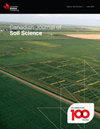Influence of Pulse-Wheat Crop Rotations on Aggregate Size Distribution Dynamics in the Brown Soil Zone in Southern Alberta, Canada
IF 1.5
4区 农林科学
Q4 SOIL SCIENCE
引用次数: 0
Abstract
Diversification of conventional cereal-based cropping systems with pulse crops may aid producers to grow crops in an appropriate sequence and frequency with environmental, social and economic benefits. This study examined the effects of including three pulse crops with different rooting depths (shallow- and deep-rooted) in wheat-based crop rotations on soil aggregate size distribution under semi-arid and rain-fed conditions. A 4-year cycle rotational study was established in Brooks, AB using five selected treatments: continuous wheat, wheat alternately grown with lentil, field pea, or chickpea, or lentil and chickpea alternately grown with wheat. Soils were collected from 0-5 cm-depth and dry sieved to produce eight aggregate size classes, <0.053 mm, 0.053-0.125 mm, 0.125-0.149 mm, 0.149-0.05 mm, 0.05-1.0 mm, 1.0-2.0 mm, 2.0-6.35 mm and >6.35 mm. The continuous wheat treatment improved the macro-aggregates (>6.35 mm) development, whereas the rotations with pulse-wheat crops increased the micro- and meso-aggregates (0.50-1.0 mm and 0.15-0.5 mm) development. Soils sampled at 0-15 cm-depth were used for soil organic matter and microbial analysis. The pulse-wheat rotations collectively had more light fraction organic matter (LFOM) than the continuous wheat, and chickpea alternated with wheat had the highest amount of LFOM in both years. All treatments had similar soil microbial biomass and microbial community composition. Our study underscores the contribution of pulse crops in cereal-based cropping systems in the formation of small aggregates.小麦轮作对加拿大艾伯塔省南部棕壤区团聚体粒径分布动态的影响
采用脉冲作物的传统谷物种植系统的多样化可能有助于生产者以适当的顺序和频率种植作物,并带来环境、社会和经济效益。本研究考察了在半干旱和雨水灌溉条件下,在小麦轮作中包括三种不同生根深度(浅根和深根)的脉冲作物对土壤团聚体粒径分布的影响。在Brooks,AB建立了一项4年周期轮换研究,使用了五种选择的处理:连续小麦、与扁豆交替生长的小麦、田豌豆或鹰嘴豆,或与小麦交替生长的扁豆和鹰嘴豆。从0-5厘米的深度收集土壤,并进行干筛,以产生8种大小为6.35毫米的团聚体。连续小麦处理改善了宏观团聚体(>6.35毫米)的发育,而脉冲小麦作物的轮作增加了微观和中等团聚体(0.50-1.0毫米和0.15-0.5毫米)的发展。在0-15cm深度取样的土壤用于土壤有机质和微生物分析。脉冲小麦轮作总体上比连续小麦具有更多的轻组分有机质(LFOM),鹰嘴豆和小麦轮作具有最高的LFOM含量。所有处理的土壤微生物生物量和微生物群落组成相似。我们的研究强调了谷物种植系统中脉冲作物对小团聚体形成的贡献。
本文章由计算机程序翻译,如有差异,请以英文原文为准。
求助全文
约1分钟内获得全文
求助全文
来源期刊

Canadian Journal of Soil Science
农林科学-土壤科学
CiteScore
2.90
自引率
11.80%
发文量
73
审稿时长
6.0 months
期刊介绍:
The Canadian Journal of Soil Science is an international peer-reviewed journal published in cooperation with the Canadian Society of Soil Science. The journal publishes original research on the use, management, structure and development of soils and draws from the disciplines of soil science, agrometeorology, ecology, agricultural engineering, environmental science, hydrology, forestry, geology, geography and climatology. Research is published in a number of topic sections including: agrometeorology; ecology, biological processes and plant interactions; composition and chemical processes; physical processes and interfaces; genesis, landscape processes and relationships; contamination and environmental stewardship; and management for agricultural, forestry and urban uses.
 求助内容:
求助内容: 应助结果提醒方式:
应助结果提醒方式:


